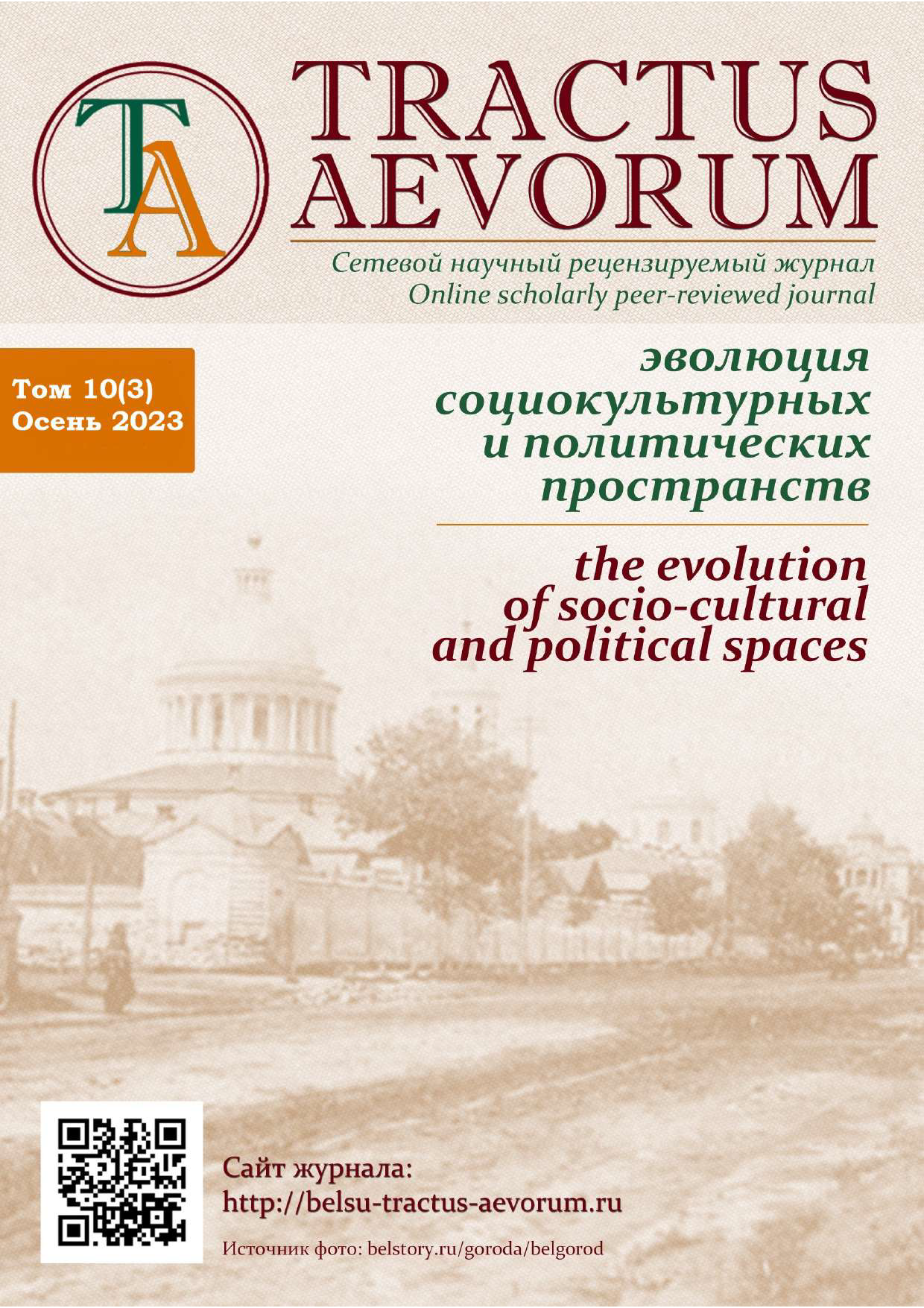|
HISTORICAL MEMORY AND OBLIVION
|
Eschatological movements in the religions of the post-reform Russian Empire: historical memory and forgetting
|
  |
Original article
Тony Rocchi
Former librarian at Toronto Reference Library.
Now an independent researcher and pensioner.
Toronto, Canada
E-mail:
This e-mail address is being protected from spambots. You need JavaScript enabled to view it
Abstract. Eschatology is a religious doctrine about the coming end of the world and the coming of a new age. Beginning with the French Revolution, eschatology acquired a political content and was used often by many ideologies to explain the course of history, especially in crisis times. This article examines different eschatological movements in the religions of the post-reform Russian Empire between 1861-1917. When scholars write about eschatological movements in Russia, they usually concentrate on the Old Believers and Russian sectarians. However, Russia, as the most multireligious country in Europe, had many eschatological movements. These movements coexisted with political eschatological movements and sometimes intersected.
Keywords: eschatological movements, religion in the Russian Empire, chiliasm.
DOI: 10.18413/2312-3044-2023-10-3-312-343
|
The Soviet-Japanese War of 1945 in the historical memory of students
|
  |
Original article
Elena V. Taltynova
Voronezh State Pedagogical University
86 Lenina St., Voronezh, 394043, Russia
E-mail:
This e-mail address is being protected from spambots. You need JavaScript enabled to view it
Abstract. The article is devoted to the study of the attitude of students of the Voronezh State Pedagogical University to the historical memory of the events of the Soviet-Japanese war (August 9—September 2, 1945).The article deals with the problem of the "forgotten" Victory Day of the USSR over militaristic Japan, the task is to update the role of the heroic past of the Soviet people in the war with the Kwantung Army at the final stage of World War II.The article presents the analysis and results of a sociological survey, the purpose of which was to identify students' knowledge about the role of the Soviet Union in the victory over militaristic Japan.
Keywords: Soviet-Japanese war, Kwantung army, capitulation of Japan, historical memory, sociological survey, analysis.
DOI: 10.18413/2312-3044-2023-10-3-344-356
|
Nostalgia for one Soviet practice: socialist competition of the 1960s in the memory of modern non-capital townswoman
|
  |
Original article
Natalia L. Pushkareva, Alexander V. Zhidchenko
Institute of Ethnology and Anthropology RAS
48 Vavilova st., Moscow, 119333, Russia
E-mail:
This e-mail address is being protected from spambots. You need JavaScript enabled to view it
,
This e-mail address is being protected from spambots. You need JavaScript enabled to view it
Abstract. The article reconstructs a page of the country's history in the era of the Khrushchev thaw, which has long been included in the "register of the forgotten": a utopian form of competition between two cities for the best solution to the problem of their greening. In the 1950s-1960s. ideology clothed such a competition in order to increase the pace of work of the competing parties in a game form so that the participants in the competition do not feel the strengthening of control over the degree of labor productivity, the accuracy of their use of material resources. This ideological maneuver was so successful for its initiators that even after more than half a century in the social memory of the competition participants there were no vague guesses about unpaid time, labor costs, sophisticated exploitation, and only bright emotions, strongly mixed with "nostalgia for the Soviet", remained. Based on the concept of “anthropology of trust” (une anthropologie de la credibilite) by M. de Certeau, the authors characterize the phenomenon they are studying “not for the past with nostalgia, nostalgia for the present” (the expression of the poet Andrei Voznesensky). They mean nostalgia for true friendship, a sense of complicity in an important and necessary business for everyone, for genuine enthusiasm. Having studied the attempt to create a real garden city in the Siberian city of Omsk, the researchers came to the conclusion that the traditional spirit of communality, collectivism, was preserved in the collective undertaking they were studying.
The analyzed narratives also confirmed that the exploitation of people's spiritual aspirations is a resource state, unstable and unable to be exploited for many years in a row. The forgotten fact of organizing socialist competition between Omsk and Leningrad is now no more than a part of the oral tradition. But the analysis of it made it possible to find out how the collective change in the crucible of individual practices makes it possible to more deeply comprehend the life of generations, its assessment by the carriers of collective memory. This assessment is positive. The gender factor (the article analyzes the everyday memories of women about their youth) also played a role.
Keywords: memory, oblivion, socialist utopia, ego documents, oral history, everyday practices, gender characteristics of memorization.
Acknowledgements: It was carried out in accordance with the research plan of the N.N. Miklukho-Maklay Institute of Ethnology and Anthropology of the Russian Academy of Sciences, within the framework of a grant provided by the Ministry of Science and Higher Education of the Russian Federation (Grant agreement No.: 075-15-2020-910).
DOI: 10.18413/2312-3044-2023-10-3-357-371
TRANSITIONAL EPOCHS
|
The attempts of the supreme power to create a draft of a new Code in the second half of the 1720s – early 1730s and the participation of the authorities and the population of the Belgorod province in this matter
|
  |
Original article
Alexandr A. Kolotushkin
State Archive of the Belgorod Region
14 Mokrousova st., Belgorod, 308024, Russia
E-mail:
This e-mail address is being protected from spambots. You need JavaScript enabled to view it
Abstract. The article is devoted to the attempts of the supreme power of the Russian Empire in the second half of the 1720s to develop a draft of a new code of laws that would replace the Cathedral Code adopted in 1649 during the reign of Tsar Alexei Mikhailovich. The process of involving provincial managers in this case, which in turn had to initiate and control the selection of representatives in the territories under their control for sending to Moscow and participating in the work of the Laid Commission, is investigated on the example of the Belgorod province formed in 1727.
Keywords: Belgorod Province, Laid Commission, Cathedral Code, Supreme Privy Council, Senate.
DOI: 10.18413/2312-3044-2023-10-3-372-387
|
Using the potential of local lore societies to carry out the "Cultural Revolution" in Soviet practice in 1920-1921 (on the example of Orenburg region)
|
  |
Original article
Larisa P.Kalduzova, Galina A.Kalduzova
Orenburg State Pedagogical University
Orenburg, 19 Sovetskaya str., 460018, Russia
E-mail:
This e-mail address is being protected from spambots. You need JavaScript enabled to view it
,
This e-mail address is being protected from spambots. You need JavaScript enabled to view it
Abstract. The subject of consideration in the article is the scientific potential of provincial local history societies based on the pre-revolutionary experience. The enthusiasm and desire to continue their work in the new conditions led to the activation of the local history movement both in the whole country and in the Orenburg region. In recent years, interest in the Soviet period of the history of local lore societies has intensified, but the connection of these societies with the process of creating a Soviet labor school has not been sufficiently studied. The authors have identified the real contribution of the Society for the Study of the Kyrgyz Territory to the study of the region and to the solution of the tasks set by the Soviet government on the restructuring of the school, on school local lore.
Keywords: school local history, State Academic Council (SUS), "complexes", teaching methods, "local history book", scientific local history societies of Orenburg.
DOI: 10.18413/2312-3044-2023-10-3-388-399
|
Image of modern noble assemblies in the national mass media
|
  |
Original article
Ekaterina P. Barinova
Samara University
34 Moscow Hw., Samara, 443086, Russia
E-mail:
This e-mail address is being protected from spambots. You need JavaScript enabled to view it
Igor O. Trubitszyn
Togliatti State University
14 Belorusskaya St, Tolyatti, 445020, Russia
E-mail:
This e-mail address is being protected from spambots. You need JavaScript enabled to view it
Abstract. Based on the analysis of periodical press materials and Internet sources the image of the descendants of the nobility and their public associations — noble assemblies is presented. Two groups of information content that are most widespread are identified: those relating to the acquisition of the title of nobility, joining the noble assembly and those describing the internal conflicts taking place in the Russian noble assembly. It is noted that the acquisition of the title of nobility was associated with the growth of fraud and contributed to the formation of negative attitudes towards the descendants of the nobility in modern Russia. Conflict situations, as a rule, were caused by the struggle for power in the Russian Noble Assembly and often led to splits in the organisation and the formation of its "scandalous" image.
Keywords: descendants of the nobility, Russian Nobility Assembly, conflicts, leader of the nobility, granting titles.
DOI: 10.18413/2312-3044-2023-10-3-400-415
|



